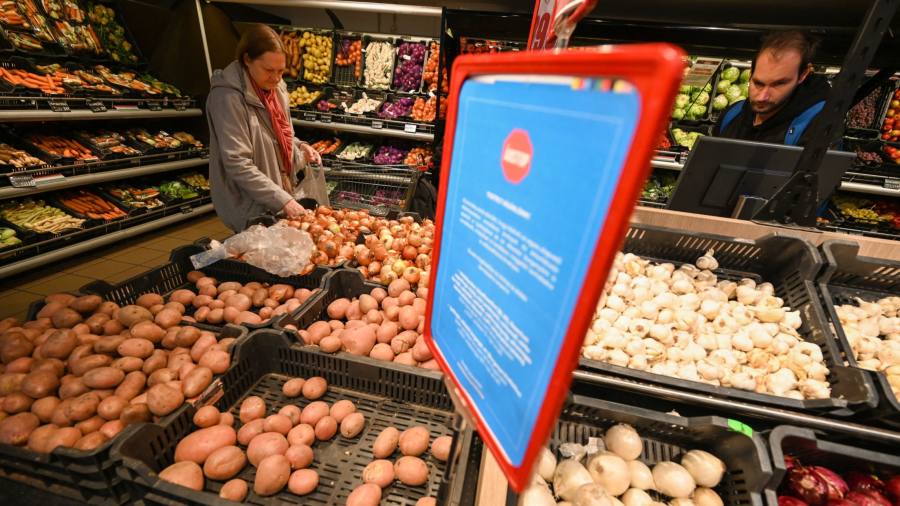Europe’s retailers and governments are locked in their fiercest tussle over food costs for 50 years, with policymakers resorting to price controls to tackle the worst cost of living crisis for a generation.
Despite lower energy prices easing overall price pressures, growth in the cost of food has continued to soar, prompting increasingly unconventional market interventions from politicians trying to assuage public anger.
Food prices in the EU rose 16.6 per cent in the year to April, according to Eurostat, far in excess of a headline inflation rate of 8.1 per cent. Some of the biggest surges have been in the cost of staples, with the cost of eggs rising 22.7 per cent over the period, whole milk up 25 per cent, and sugar by 54.9 per cent.
“We haven’t had price controls in a general pattern in the western world since the 1970s,” said Lars Jonung, a Swedish economist and expert on the controversial caps.
Central and eastern European states hardest hit by rising prices, such as Hungary and Croatia, have moved to cap the cost of essentials to shield the most vulnerable, who tend to spend more of their income on food.
Nora, a 32-year-old mother of three in Budapest, said it was “nice” that price controls had made products such as whole milk cheaper. But she noted that supermarkets had started limiting purchases, meaning she had to visit multiple stores or go shopping every day to take advantage.
Greece has taken an alternative approach to limit prices by capping retailers’ profit margins on food and other essentials.
In richer economies, France has negotiated a looser agreement with supermarkets to offer a selection of items at the lowest possible price. Spain is one of several countries to have cut value added tax on food. Others, such as Italy, are coming under pressure to cap the cost of beloved foodstuffs such as pasta.
The pressure on retailers to toe the line on price rises has been exacerbated by a sharp fall in the cost of agricultural commodities over the past year. The UN’s Food Price Index was 19.7 per cent lower in April, compared with the same month last year.
“While some price hikes may be justified, there is growing suspicion that others are just opportunistic excuses by businesses to inflate prices,” said Monique Goyens, director-general of the Bureau Européen des Unions de Consommateurs, which represents 46 consumer organisations from across the continent, who called on governments to “adopt strong measures to protect consumers against spiralling prices”.
The Belgian consumer protection organisation Test Achats has called for a similar measure to France’s original anti-inflation basket proposal, which was tougher than what Paris has been able to implement. Austria’s chamber of labour body, AK, has also called for “price regulation” of foods.
However, retailers say that they are not to blame and that, far from price gouging, are having to take the hit on capped goods.
Kodály Delikatessen, a small supermarket in Pécs, southern Hungary, has grouped capped products under a sign that warns customers against buying “products of the dictatorship”, saying the wholesale price of certain items was higher than the capped retail price.
The Delikatessen added: “The regulation forces us to sell at a loss!”
Large businesses operating in Hungary — such as Lidl, Spar and the French retailer Auchan — have claimed the same.
“If you are procuring sugar, you’re paying 500 forints (€1.35) per kilo and you have to sell it for 300 forints (€0.85),” one representative of an international retailer said. “You make a negative margin for each unit sold, which is completely absurd in a sector like retail that is characterised by high volumes and low margins.”
While the measures have been successful in keeping a lid on the cost of essentials, economists think they are a poor fix for high food prices.
A World Bank report on Thursday called on European governments to provide more “targeted policy interventions and social safety nets” to support those suffering from the cost of living crisis. However the multilateral lender stressed that price controls and subsidies were “suboptimal as they distort price signals for consumers and producers.”
Hungary’s central bank governor György Matolcsy went further in a parliamentary hearing in December. “You can’t win this battle with old tools,” he said. “Price caps and all similar ideas already proved ineffectual during socialism.”
“You may cap one type of milk, but the inflation basket contains dozens of types,” said Péter Virovácz, an analyst at ING Bank.
But the struggles faced by shoppers hit by the soaring cost of their weekly shop mean economists fear politicians will continue to resort to price caps, regardless of their effectiveness.
“As an instrument to reduce inflation, price controls do not work,” said Jonung. “But they are addictive and it’s difficult to kick the habit.”
Additional reporting by Leila Abboud in Paris
Read the full article here




